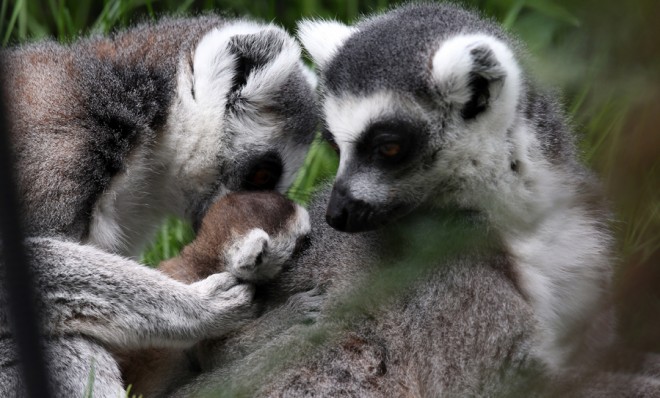The ultra-violent origins of monogamy
Male infanticide may play a role

A free daily email with the biggest news stories of the day – and the best features from TheWeek.com
You are now subscribed
Your newsletter sign-up was successful
Despite the very public indiscretions of a certain Democratic candidate vying for the New York City mayorship, monogamy is more or less the norm for an evolved species such as humans. But remember: Just 3 percent of all mammals abide by the general rule of pairing one male and one female together to procreate. (By contrast, 90 percent of all bird species are monogamous.) So why did humans become monogamous in the first place?
Many denizens of the animal kingdom rely on non-monogamous mating habits. The red squirrel, for instance, is polyamorous, allowing males to reproduce with as many females as possible to ensure their species' survival. Others, like the bizarre naked mole rat, abide by a eusocial colony structure, in which one queen takes her pick among a collective of breeding males, kind of like bees or wasps.
So what evolutionary advantage does choosing a single mate offer for mammals like monkeys, chimps, lemurs, and humans? Scientists have three competing theories:
The Week
Escape your echo chamber. Get the facts behind the news, plus analysis from multiple perspectives.

Sign up for The Week's Free Newsletters
From our morning news briefing to a weekly Good News Newsletter, get the best of The Week delivered directly to your inbox.
From our morning news briefing to a weekly Good News Newsletter, get the best of The Week delivered directly to your inbox.
1. Keeping a male around to help raise offspring makes life easier for females.
2. Having a male around keeps rival males at bay. This is termed "mate guarding."
3. Having a male around is handy when rival males try to steal and murder a female's children in hopes of getting her pregnant again.
If you couldn't tell by the headline, this article concerns No. 3.
A free daily email with the biggest news stories of the day – and the best features from TheWeek.com
Christopher Opie, an anthropologist at University College London, developed a computer model to test these three hypotheses and published the findings in the Proceedings of the National Academy of Sciences. The simulation took a look at the family trees of some 230 mammals like bushbabies and monkeys. He plugged in known research statistics like animal infanticide rates and paternal care.
Next, Opie and his team simulated evolution for all the animals, from 75 million years ago to today. Per the Guardian:
As the simulation ran, it showed how monogamy rose and fell for different species. Having run the program millions of times, they found that the evolution of monogamy in primates was preceded by one thing only: Infanticide by males. [Guardian]
The shift to social monogamy, in other words, appears to have violent beginnings. Since females are incapable of becoming pregnant while weaning children (i.e. lactating), a male aggressor will kill a female's children so he can inseminate her with his own seed. Yet if the female's mate is already nearby, those infanticide rates plummet. "Our analyses suggest that socially monogamous species are much more likely to have low male infanticide rates," the study concludes.
Not everyone agrees with Opie's conclusions. Maren Huck, a primate researcher at the University of Debry in the United Kingdom, tells CNN that "[it] would be premature to confidently claim that infanticide was the key factor in the evolution of social monogamy in primates." In fact, questions remain whether several of the mammalian species — humans included, duh — can safely be lumped in the monogamous category to begin with.
A separate monogamy study published in Science this week looked at more than 2,500 mammal species (but did not include humans). Researchers posited that male-female pairings allowed mammalian couples to venture farther away from groups in search of food. When intrusive females would happen upon their small family's territory, the female mate would aggressively chase them away. Here's the catch: When food is bountiful in a group, the survival-based monogamy disappears, and the male eye is likely to wander. Thus, polygyny — when one male sews his oats among multiple mates — becomes the standard.
Why the starkly different findings? The two teams say they were unaware of one another's studies, and say they intend to compare notes to see how their conclusions were reached. In the meantime, however, human males still in search of a mate may find some success writing "adventurous foodie" and "not likely to commit infanticide" on their OK Cupid profiles.